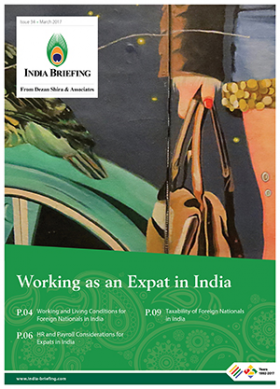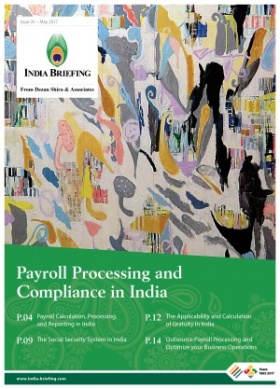Delhi NCR – An Emerging IT Hub in India
India has successfully established its information technology (IT) and IT enabled services sector, which currently accounts for about 67 percent of the world’s US$124-130 billion IT market. Overall, the IT sector generates over 10 million jobs in India.
This has led to the growth of several IT hubs across the country such as Bangalore, Delhi National Capital Region (NCR), Pune, and Hyderabad. While Bangalore is still regarded as the Silicon Valley of India, Delhi NCR is fast emerging as India’s foremost IT destination.
India’s IT profile
The IT industry in India has grown considerably in the last two decades. Its share of the country’s GDP increased from 1.2 percent in 1998 to an estimated 9.3 percent in 2016. As per National Association of Software and Services Companies (NASSCOM) estimates, India’s IT market is further expected to grow to US$350 billion by 2025 (see figure below).
India houses various domestic and multinational IT companies such as: IBM, Dell, Microsoft, HCL, Cognizant, WIPRO, INFOSYS, TCS, etc. The rapid development of the country’s software industry is in large part due to the availability of technically skilled manpower and the cost effectiveness of doing business, supported by the government’s friendly policies and incentive schemes.
Delhi NCR – Emerging IT hub
Delhi NCR comprises of the national capital territory of New Delhi and several districts surrounding it from the states of Haryana, Uttar Pradesh, and Rajasthan. Prominent among these districts are Noida (in Uttar Pradesh state) and Gurugram (erstwhile Gurgaon, in Haryana state).
Delhi NCR has become one of the fastest growing economic regions of India, accounting for seven to eight percent of the nation’s total GDP. Its proximity to government institutions, the presence of a business friendly infrastructure, and a burgeoning entrepreneurship culture make the city a viable IT hub.
Consequently, several companies have set up their delivery centers and liaison offices in Noida, Delhi, and Gurugram in order to take advantage of the high quality infrastructure, manpower, real estate, and supportive government policies.
Some of these key advantages are listed below:
- Regional connectivity
Delhi NCR is an extremely well connected region. It has one of the busiest international airports in the world – Indira Gandhi International Airport, and boasts of an excellent network of railways, roadways, and metro rail. Additionally, Delhi is well connected to its satellite cities – Gurugram and Noida via the Delhi Gurugram expressway and the DND flyover, respectively. The enhanced inter-state connectivity enables easy accessibility to a diverse labor pool and market from its neighboring states.
- Skilled workforce
The presence of premier educational institutions such as the Indian Institute of Technology (IIT), Delhi; Jawaharlal Nehru University (JNU), Delhi Technological University (DTU), and University of Delhi (DU), among others, has ensured a steady supply of skilled workforce, essential for the growth of the IT industry.
- A leading startup destination
India is the third largest base for tech startups in the world, according to NASSCOM. There are currently more than 4,100 startup enterprises in India, and industry experts note that the number of startups are expected to rise to 11,500 by 2020. Out of the total US$1.8 billion raised by Indian startups in 2016, more than half of it was invested in the Delhi NCR region.
Delhi NCR is a favored startup destination because it provides firms with easy access to foreign investors, government agencies, and early stages funding that are vital for any new venture’s success. There are several startup incubators and accelerators in the region associated with the government, educational institutions, and venture capitalists. At present, it is home to almost 23 percent of India’s startups, which include Grofers, Paytm, and Snapdeal.
Investing in IT – Delhi state incentives, federal policy
The Government of India and state governments have taken several important steps in promoting the growth of the IT industry in India. Some of them are mentioned in the table below.
Challenging times ahead
Amidst rapidly evolving technology, business and service models, shifting consumer preferences, and macroeconomic uncertainties, organizations often struggle to meet the more disruptive of these challenges. Presently, India’s IT Industry is facing several such challenges:
- Shift to automation, robotisation, and machine learning in the global IT industry: This means that IT work will no longer be labor-intensive, making it especially challenging for a labor surplus market like India. The sector is required to focus more on the new emerging trends like Social Media, Mobility, Data Analytics, and Cloud Computing (SMAC).
- Increasing protectionism in major markets: The US contributes to more than 60 percent of India’s software exports and is in the midst of drafting highly protectionist laws.
- Increasing competition from China and Philippines: The Philippines with its high ‘voice’ revenues and China, with its cost and infrastructure benefits, are proving to be strong challengers to India’s outsourcing industry.
- High attrition rates in the IT-BPO segment: According to NASSCOM, India faces high attrition rates, ranging between 25-40 percent, in the Business Process Outsourcing (BPO) segment. On average, an Indian BPO employee works for 11 months, whereas an average UK call centre employee stays in a company for three years. Apart from a loss of skillsets, the cost of recruitment and training present an additional expenditure for Indian IT-BPO firms.
Delhi NCR – Growing prospects abound
Regardless of the structural challenges posed to the IT sector in India, Delhi NCR offers a dynamic and highly-functioning ecosystem that sees investors, government policymakers, skilled professionals and entrepreneurs, and startup incubators and accelerators. These positives coupled with its expanded territory and excellent connectivity and infrastructure ensures its steady growth towards becoming India’s top IT hub.
About Us
India Briefing is published by Asia Briefing, a subsidiary of Dezan Shira & Associates. We produce material for foreign investors throughout Eurasia, including ASEAN, China, Indonesia, Russia, the Silk Road, & Vietnam. For editorial matters please contact us here and for a complimentary subscription to our products, please click here.
Dezan Shira & Associates provide business intelligence, due diligence, legal, tax and advisory services throughout India and the Asian region. We maintain offices in Delhi and Mumbai and throughout China, South-East Asia, India, and Russia. For assistance with India investment issues or into Asia overall, please contact us at india@dezshira.com or visit us at www.dezshira.com.
- Previous Article Labelling and Customs Regulations in India
- Next Article Visakhapatnam: Invest in India’s Leading Port City














